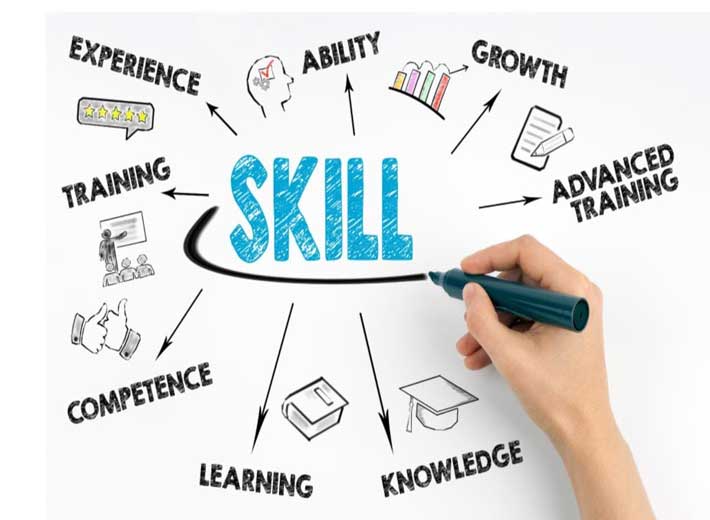
With technology becoming more and more prevalent in the workplace, it′s more important than ever to have basic computer skills. An employer will be looking for computer skills on your resume, and you need to be able to walk the walk in addition to talk to the talk—meaning that you need to be able to know how to use a computer when you′re on the job.
Most likely, you only have so much free time that you can dedicate to learning a new skill. Accordingly, it′s important to use that time wisely. Whether you′re looking to pivot your career or level up within your current field, analyzing the job description of your ideal position is a great way to identify what skills employers are looking for, as well as the tools you should know how to use. The "Requirements" section of a job description is generally a good place to find this information.
Networking is another great way to discover what technical skills other people in your field have, or what software and apps they use on a day-to-day basis. This can be accomplished with a simple question, such as "Have you learned any new skills lately that have helped you in your job?," or "What′s your favorite software or app that use regularly for work?"
In addition, you can also find much of this information online. If you are a customer service representative, for example, you might search for “customer service software.” Keep an eye out for the specific products that appear in your results. Capterra, a software review company, is another helpful resource for identifying common tools in your trade.
Not sure where to start? The specific skills you need are highly dependent on your position and your field, but you can familiarize yourself with this list of top computer skills to start out.
While this goes without saying, before you learn any specialized technical skills, at the very least you need a fundamental understanding of how to use a computer—ideally, both a Windows or Mac. There are many free resources online. Sites like Lifewire, for example, are very helpful in providing comprehensive tutorials.
These days, it′s pretty common to find free (or affordable) computer training events. Check with your local library, community center or community college to see what they have to offer. In addition, you can take free Mac courses at an Apple store near you.
While this goes without saying, before you learn any specialized technical skills, at the very least you need a fundamental understanding of what a computer it is and how it works. In some cases, it can be helpful to learn how the Internet works, too.
Now, do you need master computer science? Absolutely not. But, having an elementary understanding of how the technology that you use functions provides a strong foundation for future learning. Here is a list of some free online computer skills lessons that you can start with:
There are many free resources available, both offline and online. Be sure to check out offerings in your community, such as at your local library, community center, community college or YMCA. You can also search on sites like Meetup or Eventbrite for educational events or groups. If you live in Los Angeles, New York City or Chicago, CourseHorse is another excellent resource.
If you′d rather learn tech skills for free online, there are plenty of ways to do so! You should be able to search on YouTube for pretty much anything you want to know. If you′re looking for a more formal learning experience, you can find tons of free college-level courses online on sites like Coursera, EdX and Class-Central. You can also find free, introductory courses on sites like Khan Academy, Codecademy, and Free Code Camp.

As we swiftly move towards paperless workspaces, every function requires at least some level of interaction with computers. Those with sharp skills in using computers get an edge over those who don′t when interviewing for the same profile. And the good news is that using basic computer applications to get work done is not difficult at all. After putting some effort into getting acquainted with the applications, you will start experiencing much more efficient workdays.
An office would find it difficult to function without Microsoft Office. The suite has a set of tools that almost all functions at all workplaces have some use for. If you are still not very confident about your MS Office skills, brush them up before you start losing out on excellent job opportunities just because of this one shortcoming. Here is what all you need to learn:
Web skills include being able to do an effective research on data, acquire a new skill off the Internet, or quickly get images or graphics to support your presentations. Even though nearly everybody can accomplish these tasks, those with real skills will be able to do so considerably faster than the others.
Social media skills too are exceptionally important in today′s workplace. This is the space where a significant number of leads are obtained, networks are formed and even hiring takes place. To begin with, brush up your LinkedIn profile and approach recruiters – this will in itself enhance your chances!
If a frozen program or a malfunctioning USB port leaves you in a frenzy, it is time to study the systems a little better so you can fix up little problems on your own. Delve a little into the common software and hardware you use, and watch YouTube videos on how to troubleshoot issues like crashes etc.
From marketing to product design, graphics find a crucial space in many industry verticals, and knowing how to use all the computer resources at hand to create graphics is a highly valued skill.
Whether you write about your own career progressions or do so for a product or service on behalf of a company, blogging is ubiquitous. Good blogs not just inform but also entertain the reader. If you have knowledge, blogging is one of the best ways to share it, and also to let potential employers understand the value you could bring them.
Analytical writing is a powerful skill. While creative writing may be a bit of an inherent talent, analytical writing is a skill you can develop. Read lots of good blogs from your industry, make writing a habit and don′t hesitate in getting writing tips and feedback on your own writing by others. If you are planning to be a professional writer, you need to learn to use various tools such as spreadsheets, video editing, blogging platforms, collaboration apps etc to succeed.
Besides generic computer proficiency, different job profiles may require their own specific set of computer skills. If you are applying into a role for the first time, do a research into the commonest technologies in use in that area, and make an effort at learning some or all of them on your own. Not having to train an employee from scratch on a software application is a delight to most employers and will naturally earn you some brownie points in the hiring process.
Gain the skills and knowledge required to operate your computer and perform common tasks. Learn basic computer skills the smart way with Computer Basics training courses at CCE, the University of Sydney.
This basic computer skills course will allow you to gain an understanding of the most popular, current technologies used at home and in the workplace. You will become computer literate in this hands-on course while you learn to access, create, save and manage documents, spreadsheets and emails and use the Internet effectively. We demystify terminology and impart best practice skills for productive and secure use of hardware and software. This course is great for adults with no previous computer experience.
This course will allow you to become familiar with computers and Microsoft Windows while learning basic computer, mouse and keyboard skills in a supportive classroom environment.
Upon successful completion of this course, participants should be able to:
Hardware and Software
Windows
Working with Programs
File Management
Word Processing
Spreadsheets
Printing
Using Email
Accessing the Internet
This basic computer skills course is designed for adult users who have little or no understanding, knowledge of, or experience in using a computer and would like the opportunity to learn with others in a supportive and encouraging environment.
This course is presented as practical, instructor-led computer-based training. You will have dedicated access to a computer, so you can follow instructor training and work through in-class activities.